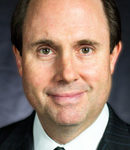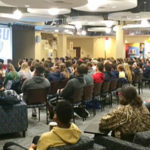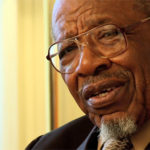Traveling more than 2,700 miles in nine days, visiting 12 museums, spending one day in hands-on service and covering 167 pages of curriculum—for 17 Baylor University students, it was not a typical college spring break experience.
|
Students reflected on their visit to Birmingham’s 16th Street Baptist Church, where a bomb placed by members of the Ku Klux Klan killed four little girls on Sept. 15, 1963.
|
The students and five faculty/staff facilitators boarded a bus—their “classroom on wheels”—and embarked on the Baylor Civil Rights tour, an experiential learning opportunity that empowered students to confront the complex issues of race and injustice in America.
The experience covered hundreds of miles of highways, freeways and even some dirt roads throughout the South, as Baylor students explored the key historical sites of the Civil Rights Movement in Little Rock, Ark.; Memphis, Tenn.; Oxford, Miss.; and Birmingham, Selma and Montgomery, Ala. They wrapped up their spring break in New Orleans, where they helped a family rebuild their hurricane-shattered home.
None of the students knew each other well—in some cases, not at all—before they began the tour. The weeklong journey sparked hours of intense conversations about issues related to the Civil Rights Movement, beginning with a visit to Little Rock Central High School, where nine African-American students enrolled in the then-segregated school in 1957.

While visiting the University of Mississippi, students heard a first-hand account of the struggle for Civil Rights from Don Cole, current assistant provost, who was expelled from Ole Miss for a peaceful protest in 1968.
|
“I can be naïve and pretend that racism does not exist today (it does), but it’s hard not to see the fruits of what started in Little Rock in 1957,” said Rachana Chhin, a junior international studies major from Houston. “The sacrifices, the triumphs, the pain caused by racism became a little bit more real as we started the first leg of our trip.”
While visiting the historic sites, students met with veterans of the Civil Rights Movement and listened to accounts of their struggle for equality and human rights. One speaker was Don Cole, assistant provost of multicultural affairs at the University of Mississippi, who was expelled from Ole Miss in 1968 for his participation in a peaceful protest.
“He endured racism and verbal abuse that was hard to listen to, let alone imagine actually enduring,” said Amanda Allen, a senior business journalism major from Shreveport, La. “His bravery and good heart were maybe the most impressive. Though he was surrounded with adversity, he was able to maintain his composure and focus. He emphasized how much hard work paid off. He was driven and clearly has been his whole life, and yet he is humble.”
 Sign up for our weekly edition and get all our headlines in your inbox on ThursdaysBaylor students assemble on the steps of Little Rock Central High School, the first stop on the Baylor Civil Rights tour. In 1957, angry mobs protested the school’s integration by nine African-American students.
|
After each experience, the students gathered into three smaller groups to debrief, which allowed the students to move from being strangers or acquaintances to being trusted companions on a journey toward deeper understanding of complex social issues. They also kept journals and posted daily updates to a blog.
“Our students were asked to think about things that are not comfortable to talk about, and they encountered some really potent images and talked to people with first-hand accounts, so we knew that the real learning was going to take place in processing what they saw and heard,” said Marianne Magjuka, coordinator of service learning initiatives at Baylor.
“Some discussions were difficult and tense as opinions and beliefs collided,” said Karin Klinger, associate director of student activities for organizations and service at Baylor. “But our students demonstrated remarkable grace, patience and compassion for one another.”
Lauren Hollon, a senior international studies major from Greenville, said her small group’s discussion after visiting Ole Miss took a different turn.

Baylor studens (left to right) Syntyche Smith, Krista Castro and Lauren Hollon helped a New Orleans family with their hurricane-shattered home during a day of service on the Baylor Civil Rights tour.
|
“We talked about how the Bible was used to bolster arguments for slavery and later to justify the separation of the races,” Hollon said. “Today, we look with shame on how Scripture was twisted to fit an agenda that discriminated against a group of people.”
As students explored their understanding of the Civil Rights Movement, they also were challenged to think deeply about their role in society and how the messages of the Civil Rights Movement affect their own sense of vocation and calling.
“It kind of makes me wonder what all am I doing with my life in order to make the world a better place,” said Tchanavia Bryant, a senior psychology/pre-med major from Sugar Land, after visiting the Birmingham Civil Rights Institute.
“People my age and younger than me have braved firehoses and dogs in order to get their rights; have stood in front of tanks in order to create change in something (they) saw as wrong. What is going to be my generation’s legacy?”
The final two days were spent in New Orleans, where the students helped a family with their house, still gutted by Hurricane Katrina. They put in insulation, hung drywall and wired the house for electricity. Syntyche Smith, a senior education major from Richmond, took it upon herself to clean and organize the house.
“When we walked in, you almost couldn’t walk into the front room of the house,” Klinger said. “When we left, there was even a dining table set up with placemats. Syntyche helped make it a home.”














We seek to connect God’s story and God’s people around the world. To learn more about God’s story, click here.
Send comments and feedback to Eric Black, our editor. For comments to be published, please specify “letter to the editor.” Maximum length for publication is 300 words.